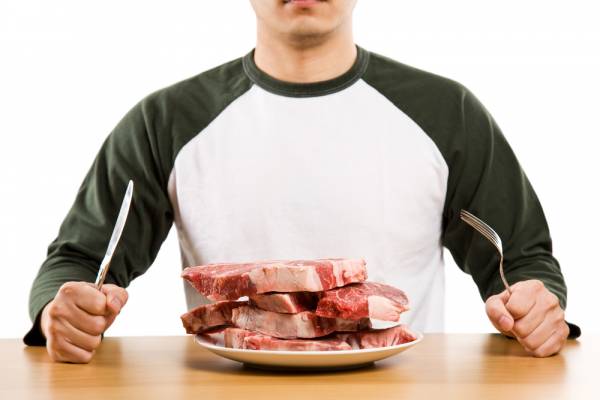With veganism trending, many people are convincing themselves that plant-based foods can suffice when it comes to daily nutritional needs, removing all traces of meat from their diets. Unfortunately, these people may be experiencing vitamin deficiencies and suffering decreased brain volume, fatigue, and confusion.
The Myths About Eating Meat
One of the greatest and most harmful nutrition myths is that meat doesn’t belong in a healthy diet. Meat consumption is blamed for high cholesterol, high blood pressure, heart disease, and obesity. But if you want to point fingers at the culprit behind these health issues, point at sugar. Blame the overconsumption of carbohydrates like grains and potatoes that break down into sugar in the body.1
For more than two million years we were primarily meat eaters. Only in the last 10,000 years did the human diet shift, with the cultivation of grains and legumes. But are we more suited to this diet lower in meat? In the last 10,000 years we’ve gotten smaller in stature and brain size. With a heavily grain- and sugar-based diet, we are suffering increased rates of obesity, cancer, diabetes, and osteoporosis. We’re also experiencing alarming incidence of skin problems, heart disease, and inflammation of all kinds.2
I have to politely disagree with the anti-meat argument. Our genes were developed before the agricultural revolution, when we were not only meat eaters, but enthusiastic ones at that. On top of that, the human genome has changed less than 0.02% in the last 40,000 years. Our bodies were genetically programed for optimal functioning on a diet including meat, and that programming has not changed.
There’s plenty of information circulating about why we shouldn’t eat meat. Here are some reasons why we should:
We Were Created That Way
By nature, humans are meat eaters, and our bodies are designed for it. We have incisors for tearing meat, and molars for grinding it. If we were meant to subsist on vegetables alone, our digestive system would be similar to that of the cow, with four stomachs and the ability to ferment cellulose in order to break down plant material.
The degenerative health conditions that are prevalent now weren’t around when the cavemen were living off meat, vegetables, fish, nuts, seeds, and fruits. In hunter/gatherer societies, 45-65% of energy requirements were derived from animal sources, and heart disease, obesity and type 2 diabetes – the diseases that plague society today – were not a problem.3 With the introduction of grains and processed foods, these diseases reared their ugly heads at alarming rates.4
Stable Blood Sugar
Meat helps keep blood sugar levels stable due to its fat and high protein content. Steady blood sugar is critical in preventing type 2 diabetes, as well as other chronic diseases. It also helps keep energy levels steady and creates a feeling of satiety between meals, reducing cravings for unhealthy foods.5 With stable blood sugar, you’re less likely to drool for fattening snacks and sweets between meals. Battle sugar cravings by eating more meat.6

Muscle Growth
You can work yourself to the bone trying to gain muscle or bulk up, but if you don’t nourish your body appropriately, you might as well toss your training schedule and start long distance running. You have to fuel your body with the right nutrients to achieve sufficient muscle repair and recovery to make gains.
You can take protein supplements, but the best source of protein is meat. Meat also contains vitamins and minerals that aid in muscle growth like zinc, which assists in muscle repair, and iron, which boosts energy levels and combats fatigue. Meat also contains creatine, a nitrogen-containing compound that improves protein synthesis and provides muscles with energy, encouraging muscle gain.
If meat’s positive – strike that, crucial – role in muscle growth isn’t enough, meat also helps burn fat. Meat has a high thermogenic effect because of its protein content, so that approximately thirty percent of its calories are burned off during digestion alone. Digesting carbohydrates produces only a six to eight percent increase in energy expenditure, while digesting the protein in meat typically produces a whopping 25 to 40 percent increase.7
Neurotransmitter Health
People who don’t eat meat are especially vulnerable to neurotransmitter imbalances because of the absence of meat protein, which provides all of the essential amino acids human bodies need. Neurotransmitters are chemical messengers that regulate many of our functions, including physical, cognitive, and mental performance, as well as our sleep cycle, weight, and emotional states. Meat protein provides all of the essential amino acids human bodies need. People who don’t eat meat are especially vulnerable to neurotransmitter imbalances, which can result in problems like depression, anxiety, and hyperactivity.
According to research conducted at the University of Graz, vegetarians are two to three times more likely than meat eaters to suffer from depression, anxiety, eating disorders, and somatoform disorders and syndromes.8 We rely on prescribed medication to cure some of these conditions, when the answer may be as simple as eating a juicy hamburger or tender chicken breast.
Long-Lasting Energy
Everyone has experienced that post-meal slump when caffeine is the only thing that can keep one’s head off a pillow. Simple carbs are broken down into sugar that our body burns through quickly, causing us to crash. Conversely, our bodies utilize the protein in meats for sustained, long-lasting energy.

Another critical component of feeling energized is the stimulation of orexin cells in the brain. The stimulation of orexin cells is directly linked to energy expenditure and wakefulness. Scientists at the University of Cambridge discovered that amino acids stimulate orexin cells more than any other nutrients do. Thus, consuming meat protein leads to burning more calories and more energy. Reduced activity in orexin cells has been linked to both weight gain and narcolepsy.9
In addition, meat is one of the best sources of iron. Iron deficits put you at risk for anemia and low energy, which is why anemia is a chronic problem for vegetarians. Pair meat with vegetables boasting a low glycemic index, and you’ll be feeling like the energizer bunny all day long.
Essential Nutrients
There are many nutrients in meat that are critical to overall health. While there are many sources of protein, meat is a great source of complete protein, containing all the amino acids our bodies needs, including the ones our bodies can’t produce.
All B vitamins are found in greater concentration in meats than in plant sources, and vitamin B-12 can only be found in animal sources. The B vitamins are critical to health, especially mental health. Deficits in these vitamins can cause confusion, impaired senses, aggression, insomnia, weakness, dementia, and peripheral neuropathy.
The Bottom Line
The last reason to eat meat? It tastes pretty damn good. Steak off the grill, roasted chicken, tender pot roasts, need I say more? For most of us, a meal is not a meal without a delicious cut of meat at the center of it. We love meat, and meat loves us back with a host of critical health benefits. So be true to your human nature and to your taste buds. Don’t cut meat out of your life. It has way too much to offer.
References:
1. Chase, B. “Sugar and Cholesterol Connection – ProgressiveHealth.com.” Progressive Health. Accessed October 4, 2014.
2. Thiessen, D. “The Awful Truth About Eating Grains.” Mercola.com. Accessed October 4, 2014.
3. Cordain, L. et al. “Plant-animal subsistence ratios and macronutrient energy estimations in worldwide hunter-gatherer diets.” The American Journal of Clinical Nutrition. Accessed October 4, 2014.
4. Auer, D. “Understanding Gluten: Part 1- A Brief History.” Doctor Auer. Accessed October 4, 2014.
5. Paddon-Jones, D. et al. “Protein, weight management, and satiety.” Am J Clin Nutr. 2008. Accessed October 4, 2014.
6. Paddon-Jones, D. et al. “Protein, weight management, and satiety.” Am J Clin Nutr. 2008. Accessed October 4, 2014.
7. Halton, TL. et al. “The Effects of High Protein Diets on Thermogenesis, Satiety and Weight Loss: A Critical Review.“ Journal of the American College of Nutrition. Accessed October 4, 2014.
8. National Health Service. “Vegetarians have ‘poorer quality of life’ study claims.” Health News. Accessed October 4, 2014.
9. University of Cambridge. “3pm slump? Why a sugar rush may not be the answer.” Accessed October 5, 2014.
Photos courtesy of Shutterstock.






